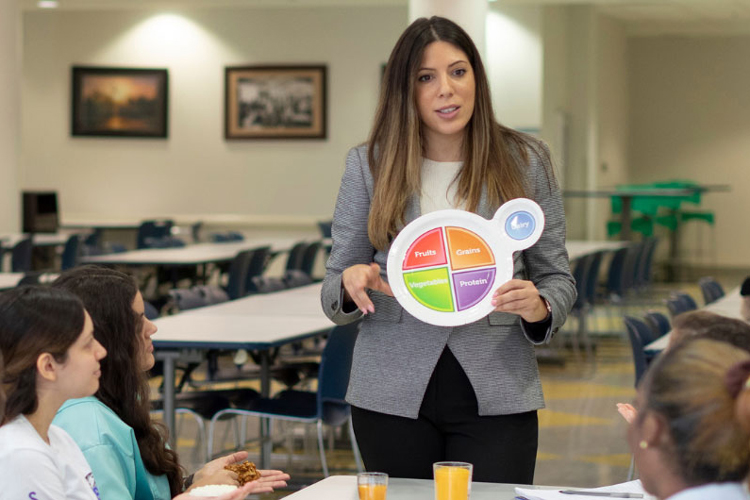Become an expert in the foundation of health and wellness with a Master of Science in Nutrition degree from Nova Southeastern University’s College of Osteopathic Medicine. You'll explore emerging topics and trends, such as genetic applications and plant-based eating patterns, while mastering behavioral concepts and evidence-based practice. Further distinguish your expertise by choosing an optional concentration in areas such as sports nutrition or herbal therapy. You'll graduate a leader in nutrition, with the distinct training and certification needed to advance your career quickly.
Where Time Meets Ambition: Transform Your Future with Flexibility
Get the flexibility you need with online and hybrid course options at the NSU College of Osteopathic Medicine. You’ll benefit from live, direct interaction with faculty. Whichever way you choose to study and learn, you will establish a network of support through faculty, advisors, and peers.
Nutrition Video
Quick Facts
For Winter Admission: December 15
For Summer Admission: April 15
Open Advising
Come join us for an open forum to learn more about the program. Meet faculty, ask some questions, and make your entry plan. We'd love to meet you.
Fridays from 11:00 am - 12:00 pm ET
January Dates: 16, 30
February Dates: 6, 27
March Dates: 6, 20, 27
April Dates: 10, 24
May Dates: 1, 8, 22
June Dates: 5, 12, 26
July Dates: 10, 24
August Dates: 7, 14, 28
September Dates: 11, 18
October Dates: 2, 9, 23
November Dates: 6, 13
December Dates: 4, 11
What Can You Do with a Master’s Degree in Nutrition?
As consumers continue to explore new ways to better their health, you can expect this diverse and dynamic field will continue to grow at a faster rate than average. With a master’s degree in nutrition, you can distinguish yourself as an expert in health education, food science, nursing, counseling, and food services.
Dietitian and Nutritionist: What's the Difference?
What Certifications Can You Earn?
Registered Dietitian Nutritionist (RDN)
Dietitians are the health professionals who translate the science and art of nutrition
and food into the practice of caring for the health and well-being of people. As part
of the M.S. in Nutrition program, the professional practice concentration (MS-RDN)
is the only track by which students may become Registered Dietitian Nutritionists.
Get in-depth training in areas of nutrition therapy, chemistry, biology, counseling, and food systems to become a licensed RDN. Use evidence-based practices to diagnose nutrition conditions or provide nutrition therapy.
Learn about the MS-RDNCertified Nutrition Specialist (CNS)
NSU's M.S. in Nutrition is approved to meet the academic requirements for the Certified
Nutrition Specialist (CNS) credential. Earn the protected title of CNS to set yourself
apart in a variety of services, including education, food science, wellness, sports
and fitness, and integrative health practice.
Candidates may be able to receive up to 300 hours of supervised training in this program. The Board of Certified Nutrition Specialists reviews each candidate individually including transcripts and 1000 hours of required practical experience to determine eligibility.
Watch the CNS Information Session
Why Earn Your M.S. in Nutrition at NSU?

Accreditation
The Master of Science in Nutrition, Professional Practice Concentration is approved by the Accreditation Council for Education in Nutrition and Dietetics (ACEND) as a Future Graduate Program. Graduates of this coordinated program meet both the didactic education and supervised training requirements to be eligible to take the examination for Registered Dietitian Nutritionists (RDN). This pathway also meets state licensing requirements for nutrition practice.
Learn more about ACEND Professional Practice Concentration InfoGet the NSU Edge
As the field of nutrition becomes more competitive, with NSU's Master of Science in Nutrition you'll get every advantage to enter it as a leader with the NSU Edge. From curriculum that covers the latest breakthroughs in nutritional science to a capstone project that preps you for career success, you'll stay ahead as a Shark.
About the NSU Edge
Nutrition M.S. Curriculum
Get a core foundation with mastery-level courses in nutrition while pursuing a concentration in sports nutrition, community nutrition, or functional nutrition and herbal therapy. Elective courses expose you to emerging topics and sought-after industry knowledge.
View Program CurriculumExplore Nutrition as a Non-Degree Seeking Student

If you'd like to take a few courses for exploration or professional development, or prep for another track, you can enroll as a non-degree-seeking student and take up to 12 credit hours. You must still apply, send in your transcripts, and pay the application fee. Non-degree admittance will only be awarded to students that have demonstrated the ability to successfully complete a graduate course. If you decide later to pursue the Master of Science in Nutrition degree, you will need to submit a new application. Your previous enrollment as a non-degree seeking student does not guarantee acceptance into the nutrition degree-seeking program. If accepted into the degree program, appropriate credits taken as a non-degree seeking student will be applied automatically toward the degree.
Professional Licensure Disclosure Statement
Licensure requirements vary across state/provincial regulatory bodies. Prospective students of the Master of Science in Nutrition are expected to review the attached Professional Licensure Disclosure Statement before making enrollment decisions and financial commitments. The program director and faculty discuss the information with the prospective students during the admissions process interviews to address all questions and concerns.
For more information, please contact Dr. Stephanie N. Petrosky, Director of Graduate and Professional Studies in Nutrition at (954) 262-1597 or spetrosky@nova.edu.
Professional Licensure Disclosure Statement
After Applying, What Happens Next?
Depending on the time of year, the review process may take a few weeks. You can check your application status at any time via the online application portal. Once a decision has been made, notification is sent via email to the address on file.







